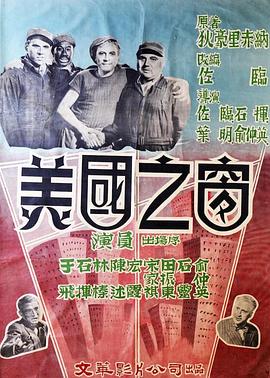A film that originates from a USSR screenplay and is brought to life by the Shanghai film industry, which is known for its realistic and leftist leanings, as well as its early romantic and metropolitan elements before the communist takeover. This story, set against the backdrop of 1950s New York, the Korean War, and McCarthyism, features a cast entirely composed of Chinese troupers. Their makeup skills are truly astonishing, and this film was produced shortly after the Chinese civil war, during the “Great Movement to Resist America and Assist Korea”.

This film holds a special place in my heart as one of my all-time favorites. Another film that I hold in high regard is “Sorrows and Joys of a Middle-Aged Man” (《哀乐中年》), starring Shi Hui. Shi Hui was an incredibly dynamic and revered actor in the 1940s and 1950s. Tragically, he took his own life (or officially went missing to escape punishment) just five years after this film, one night off a ferry named “Democracy”. In this particular film, it is hard to even recognize him as Mr. Butler. It seems as if this role provided him with a formal and final opportunity to disguise himself and sublimate all his slyness. There is not a trace of cliché in his performance, as he portrays a typical grasping American capitalist. This was quite audacious considering the puritanical Stalinist atmosphere of the time, which bore Mao’s proud signature. While watching this “New Yorker’s” flawless performance, images of his past roles flash through my mind. Like the dirty old rich man in “Long Live the Wife” (《太太万岁》1947), the sad primary school teacher in “Sorrows and Joys of a Middle-Aged Man” (《哀乐中年》1949), the Chekhovian desolate Peking cop in “My This Lifetime” (《我这一辈子》1950), and the aggressive human trafficker for brothels in “Stand Up, Sisters” (《姊姊妹妹站起来》1951). These images strike me with such force that it takes my breath away for a moment. Since his disappearance, there has never been another face like his in the history of Chinese film.
When it comes to clichés, I have noticed that only the so-called “goodies”, such as the trade unionist, seem to be stuck in an old, worn-out mold. And it’s no wonder, as they have since flooded all the communist Chinese propaganda films for decades.



